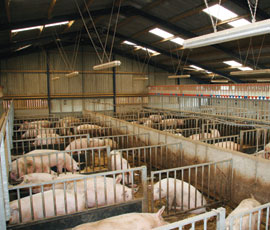Pork shortage feared as pig exodus steps up

The threat of a pork shortage is growing as an increasing number of producers take the decision to quit.
“From June to August, 11,000 extra sows were culled – the assumption is that these have been culled as producers either leave the industry or destock,” said Stephen Howarth, AHDB senior analyst for pigs.
The estimated cost of production for September was 170p/kg, while the estimated loss per finished pig was £14-15, he added.
The latest UK Deadweight Average Pigs Price is 151.58p/kg and while the DAPP has risen by just 1.5p/kg in the past 10 weeks, European pig prices have risen by 16p/kg in the same period.
BPEX advice for producers
- Don’t scrimp on feed quantity or quality, or vaccination programmes
- Don’t hold pigs back causing stocking density problems
- Keep culling rate up to maintain an efficient herd
- Consider reducing slaughter weight to reduce cost of production through enhanced feed conversion ratio
- Speak to your nutritionist to ensure optimal diet specifications and consider feeding co-products
- Look for wastage areas
A BPEX spokeswoman said: “The knowledge transfer managers are seeing a mixture of people getting out of the industry; it’s just as likely to be those who are more efficient and in tune with their figures as it is the less efficient ones.”
DEFRA figures show a total of 26,000 sows and boars were culled in England and Wales in July – 7,000 more than the month before and 25% more than in July 2011.
The issue is Europe-wide and the National Pig Association (NPA) reported last week, following a meeting of EU industry leaders in London, that pig herds were being sold across the continent due to prices not rising fast enough to cover soaring feed costs.
“Some producers have only got a few weeks left before they run out of credit at the bank and have to sell up – this is happening all over Europe,” said NPA chairman Richard Longthorp.
| Producers make difficult decisions |
|---|
| Well-respected producer David Black & Son, based in Norfolk, has announced plans to focus entirely on outdoor-reared pig production and close its two indoor units, which house 1,500 sows and employ 28 people. Production will remain in its subsidiary company Bacton Pigs, with outdoor-reared production from 2,000 sows. “We are taking some losses at the moment and they will get bigger because what we are paying for feed going forward will be higher,” said managing director James Black. “Retailers have got to turn around and stop selling pork at a much discounted price. If we carry on in a market where we have to put people’s livelihoods at risk to the extent that we are experiencing before the market makes an adjustment, it’s a pretty poor market.” One producer who has left the industry altogether is James Hart, based in Cirencester. His herd of 500 sows was culled out at the end of May. “For the past 10 years, we have not made very much money from pigs and we were guaranteed a loss for the next year,” he said. “The supply chain is completely broken – what the supermarkets and people don’t twig is that a cliff is about to be reached and supply will fall away once finisher pigs from culled herds finish.” |
Feed prices dominated pig industry challenge
